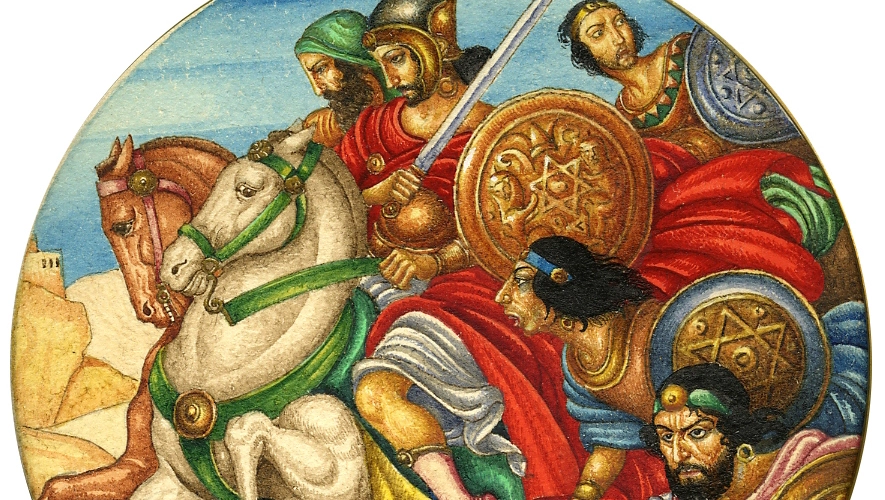
Arthur_Szyk_1894-1951._Bar_Kochba_1927_Paris
Prof. Sam Lehman-Wilzig: Who Was the Worst Leader in Jewish History? Not Bibi
The title of this essay does not raise a question that is merely academic; it can offer insight into an important contemporary issue.
Last month, former Knesset Speaker Avraham Burg opined in a David Remnick article in The New Yorker: “Historically, Netanyahu will go down in history as the worst Jewish leader ever.” Whatever one thinks of Bibi’s place in history, Burg should know better than to make such a sweeping statement. From the standpoint of a policy leading to the largest number of Jewish deaths, there is a clear “winner” in such a lugubrious competition. And the circumstances surrounding that leader’s disastrous stewardship contains a very relevant lesson for Israel today.
The destruction of the Second Temple back in 68 CE was a calamity – not only because of the loss of Judaism’s religious center but because of the demise of political sovereignty and consequent exile of many Jews. Nevertheless, despite the not-inconsiderable loss of Jewish lives by the Roman army, the Jews once again rose in rebellion a mere seven decades later (132 CE). And that’s where our story unfolds.
Briefly put, the Jews’ leader was a warrior named Bar-Kochva (“son of a star”). It is perhaps understandable (but hard to forgive) that a soldier-leader might think that his ragtag army – no matter how brave – could defeat the mighty Roman Empire with its innumerable legions. Far worse, and inexcusable, was the extremely enthusiastic moral and political support that he was given by the most eminent rabbi of the day (and up there with the most prominent in Jewish history): Rabbi Akiva.
This was completely detached from reality, quasi-messianism – completely disconnected from realpolitik, the art of the possible. Indeed, many Jews saw Bar-Kochba as the incarnation of the Messiah. What they did not take into account was the fact that after suppressing the Jews’ earlier rebellion in the previous century, the Romans would react with greater ferocity and anger at this new uprising. And that’s precisely what happened. Based on several sources, historians estimate that 580,000 Jews died in warfare (not a typo: five hundred and eighty thousand!), with fifty fortified towns destroyed and another 985 villages totally razed. And that wasn’t all: many more Jews subsequently died of hunger and disease.
Given the post-68 CE already reduced population in Israel, these numbers are proportionally beyond anything else the Jewish People have suffered at any time over the past 3500 years emanating from a Jewish leader’s policy. The recent Oct. 7 massacre saw around 1200 Israeli Jews killed, in a country with a far larger population than 2nd century Israel.
So who was the worst leader? Bar-Kochba or Rabbi Akiva? The former, but the latter is culpable as well for egging him on (against the warnings of other rabbis).
The major lesson here is that rabbis should stick to what they know best: dealing with Jewish law and the spiritual needs of their flock. Why should anyone think that rabbis have any better understanding of politics than professional politicians? Indeed, as the vast majority of rabbis (at least in Israel) have no secular, higher education to speak of, most have far less understanding of the wider world than the average educated Israeli.
Moreover, the Jewish political tradition is one of separation of powers between the religious and the secular powers: Moses and Aaron; in Babylonia: Rosh Golah (secular ruler pf the Jews) and Gaonim (the yeshiva heads); in the earlier monarchical period: kings, priests, and prophets. In short, bifurcated or tripartite separation is Judaism’s default political stance: “Three Crowns.” The great transgression of the later Maccabee family was in combining priestly and monarchical powers in one person – the reason that Hanukkah is celebrated for the miracle of lights and not for their military victories (Hanukkah’s haftorah from Zechariah 4, 6: “not by military might nor by force, but through my spirit says the Lord of Hosts”).
What does this have to do with recent events? Israel’s extreme right-wing politicians have started pushing for the resettlement of Gush Katif in Gaza, some even talking about “voluntary transfer of masses of Gazans.” Worse, they have been vocally supported by several leading rabbis (however, as in the days of Bar-Kochba other rabbis are advising against it). This is a recipe for disaster; perhaps not military, but certainly diplomatic. If the current war has taught us anything, it is that Israel cannot sustain a war without massive American and European support: diplomatically and especially in providing much needed war materiel. Given that government ministers Smotrich and Ben-Gvir adhere to their rabbis’ “advice,” history seems to be repeating itself: a disastrous policy, ignoring the realities of Israel’s position in the vast scheme of things.
Thus, my answer to Avrum Burg: PM Netanyahu is not the worst Jewish leader in history. In fact, despite his many serious failings, at least on the Gush Katif/Gaza resettlement issue, Bibi is vociferously against any such thing, fully understanding what that would mean in terms of Israel’s complete political isolation. And from there…
Afterword: When the calamity became clear to all, Bar-Kochba’s name was changed to “Bar-Koziva”: the false messiah. In pushing for resettling Gaza despite the entire world’s disapproval – friends (U.S. and European Union) and foes (the Arab World et al) alike – today’s gung-ho political warriors and their rabbinical “advisers” would do well to recall and internalize that very sorry period in Jewish history.








